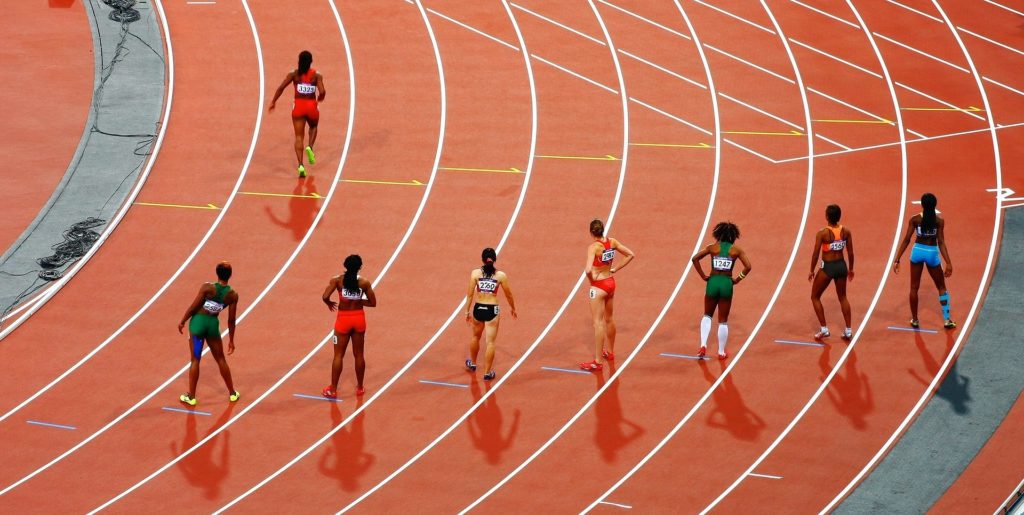
Contributor: Staff at Timberline Knolls Residential Treatment Center
It’s a question that has spawned much debate over the years since it was initially posed, but the basic mechanics of it still hold up: Would athletes be willing to sacrifice years of their life — not to mention their morals — in exchange for winning?
That’s the gist of the question physician and osteopath Robert Goldman posed to nearly 200 world-class athletes in the 1980s and 1990s. He asked if these stars in their sports would take a substance that guaranteed sporting glory but killed them in five years, and 50% of his respondents said that they would make that exchange [1].
The basic premise has been posed again in certain quarters ever since, with results generally much less in favor of taking a performance-enhancing drug (PED) in this form of a Faustian bargain. One survey of athletes in 2011 showed only 1% acceptance, for instance [2]. But that hypothetical is stretched to the extreme. An athlete’s foray into using PEDs or other substances can start out with much more innocent intentions.
Call Timberline Knolls for Help 855-630-2865
A 2013 study in the American Journal of Public Health found that adolescent athletes are 50% more likely to abuse painkillers than non-athletes [3]. If prescribed medication to help them recover from injury or alleviate pain, athletes can become addicted and move to cheaper alternatives, such as heroin.
For young athletes who are trying to excel in a particular sport in hopes of earning a college scholarship — or potentially those in college who have aspirations of playing professionally — there are other paths aside from pain tolerance that can spur struggles with addiction.
 One national study of college student drinking, for instance, found that athletes had a significantly higher rate of heavy drinking (five or more drinks in a row for men, four or more for women) than non-athletes [4]. Often, it’s the societal pressures of sport that can lead young athletes to turn to substances as an outlet. Most young people participating in sports are also trying to balance academics, family obligations, and a social life along with their athletic endeavors.
One national study of college student drinking, for instance, found that athletes had a significantly higher rate of heavy drinking (five or more drinks in a row for men, four or more for women) than non-athletes [4]. Often, it’s the societal pressures of sport that can lead young athletes to turn to substances as an outlet. Most young people participating in sports are also trying to balance academics, family obligations, and a social life along with their athletic endeavors.
There will always be reasons for young athletes to use and, consequentially, misuse alcohol or other drugs during this developmentally crucial time. Some will find themselves requiring professional treatment for a substance use disorder.
That doesn’t mean that they must give up on their hopes of participating in high-level athletics. But the path to competing while in recovery is a tricky one, and it requires a coach who can offer the right type and level of support.
Providing a Voice of Encouragement for Athletes
For a coach, helping an athlete who is in recovery from a substance use disorder can sound like an overwhelming burden. But in reality, it’s a role they’re likely familiar with — even if they might not recognize it.
Managing an athlete who is returning from injury shares a lot of similarities with helping an athlete who struggled with substance abuse. Let’s look at a few general rules for helping someone return to competition after a setback.
1. Get rid of the “tough it out” mindset
Many coaches like their teams — or individual athletes, in nonteam sports — to adopt a “we’re tougher than them” mentality. They believe that outworking an opponent is the key to success.
That’s not the way to deal with recovery from injury, where one wrong step or pushing it too far can cause reinjury. For an athlete working their way back after a battle with addiction, it can lead to relapse.
2. Don’t allow them to come back too soon
If there’s a big game or an important competition on the horizon, it’s tempting to push an athlete to come back before their injury timetable would normally allow. That’s a mistake that can lead to reaggravating the injury if it isn’t fully healed.
Coming back after struggling with a substance use disorder is as much about the mental as it is the physical. A coach must make sure that an athlete who is in recovery is in the right headspace before allowing them back in competition.
3. Focus on the positive
Returning from injury is tough. In the short term, it might take relearning a certain way of performing to reacclimate to playing at a high level. Reminding an athlete of the joys of competing and the rewards of playing their sport can go a long way.
That applies to recovery from addiction as well. An athlete who battled a substance use disorder may have lost sight of the reasons why they competed in the first place. By emphasizing the positive, coaches can allow their athletes to avoid falling into traps that may have led to substance use.
Learning to Look Out for the Best Interests of Athletes
 Toeing the line between responsibility to their team and concern for an individual can be difficult for a coach to navigate. But providing support for an athlete who is in recovery doesn’t have to require favoritism or extra attention; it just takes the effort of knowing each player as an individual so that you can do right by them.
Toeing the line between responsibility to their team and concern for an individual can be difficult for a coach to navigate. But providing support for an athlete who is in recovery doesn’t have to require favoritism or extra attention; it just takes the effort of knowing each player as an individual so that you can do right by them.
Managing individual personalities is one of the most important aspects of coaching. That could mean one thing for an athlete who is struggling to find the strike zone and something entirely different for an athlete who is trying to return from a substance use disorder.
Sit down with an athlete who is in recovery before they return to competition. Ask them how you can best help them transition back to the field and the physical and emotional rigors of sport. Assure them of privacy and confidentiality in all your conversations relating to struggles with addiction.
For many people who have struggled with a substance use disorder, finding voices they can trust is a major hurdle. By being a positive outlet and conveying that they have the athlete’s best interests at heart, a coach can be someone an athlete can lean on as they return from one of the most difficult challenges they’ll ever face.
References:
[1] Marcos Gonzalez, J., Reed Johnson, F., Fedoruk, M., Posner, J., & Bowers, L. (2018). Trading health risks for glory: A reformulation of the Goldman Dilemma. Sports Med, 48(8): 1963-1969. https://doi.org/10.1007/s40279-018-0881-9.
[2] Woolf, J., Mazanov, J., & Connor, J. (2016). The Goldman Dilemma is dead: What elite athletes really think about doping, winning, and death. International Journal of Sport Policy and Politics, 9(3): 453-467. https://doi.org/10.1080/19406940.2016.1194875.
[3] Craig, K. & Leider, P. (2016). The surprising path from student-athlete to heroin addict. CBS News. Retrieved from: https://www.cbsnews.com/news/student-athletes-on-pain-killers-at-risk-for-heroin-addiction/.
[4] College athletes and alcohol and other drug use. (2008). The Higher Education Center for Alcohol and Other Drug Abuse and Violence Prevention. Retrieved from: https://files.eric.ed.gov/fulltext/ED537640.pdf.
About Our Sponsor:
 At Timberline Knolls Residential Treatment Center, located outside of Chicago, Illinois, we provide specialized care for women and girls who are living with mental health conditions such as substance use disorders and eating disorders. Our private facility offers female-only treatment programs for eating disorders, addiction, and a range of mental health conditions. We work closely with each person to develop treatment goals to maximize strengths while focusing on individual needs. Our treatment team understands that each woman has unique needs and that she must play a role in her journey to wellness.
At Timberline Knolls Residential Treatment Center, located outside of Chicago, Illinois, we provide specialized care for women and girls who are living with mental health conditions such as substance use disorders and eating disorders. Our private facility offers female-only treatment programs for eating disorders, addiction, and a range of mental health conditions. We work closely with each person to develop treatment goals to maximize strengths while focusing on individual needs. Our treatment team understands that each woman has unique needs and that she must play a role in her journey to wellness.
The opinions and views of our guest contributors are shared to provide a broad perspective of addictions. These are not necessarily the views of Addiction Hope, but an effort to offer a discussion of various issues by different concerned individuals.
We at Addiction Hope understand that addictions result from multiple physical, emotional, environmental, and genetic factors. If you or a loved one are suffering from an addiction, please know that there is hope for you, and seek immediate professional help.
Published on June 9, 2021
Reviewed by Jacquelyn Ekern, MS, LPC on June 9, 2021
Published on AddictionHope.com

